- Clone
- W15101A (See other available formats)
- Regulatory Status
- RUO
- Other Names
- Epidermal growth factor module-containing mucin-like receptor 2, EMR2, AGRE2, ADGRE2
- Isotype
- Rat IgG2a, κ
- Ave. Rating
- Submit a Review
- Product Citations
- publications
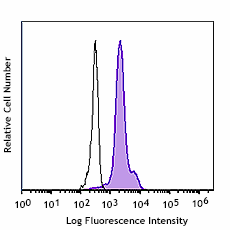
-

Human peripheral blood monocytes were stained with anti-human CD312 (clone W15101A) FITC (filled histogram) or rat IgG2a, κ FITC isotype control (open histogram).
| Cat # | Size | Price | Quantity Check Availability | Save | ||
|---|---|---|---|---|---|---|
| 373105 | 25 tests | 118 CHF | ||||
| 373106 | 100 tests | 282 CHF | ||||
CD312, also known as Epidermal growth factor module-containing mucin-like receptor 2 (EMR2), is a 90 kD type I protein, a member of the Epidermal Growth Factor-seven transmembrane (EGF-TM7) family. Its extracellular region consists of five tandem EGF-like adhesion domains and a mucin-like stalk domain containing a G-protein proteolytic site, while the C-terminal region consists of a seven-pass transmembrane domain. CD312 is expressed by myeloid cells, dendritic cells, and activated lymphocytes. CD312 contributes to the interaction of macrophages, dendritic cells and activated T cells with B cells; it is involved in neutrophil chemotaxis, degranulation and adhesion, and release of inflammatory cytokines by macrophages. The ligands of CD312 are the glycosaminoglycans (GAG) chondroitin sulphate, and dermatan sulphate.
Product DetailsProduct Details
- Verified Reactivity
- Human
- Antibody Type
- Monoclonal
- Host Species
- Rat
- Immunogen
- Recombinant protein fragment containing the first extracellular region of human EMR2 (24-540 a.a.).
- Formulation
- Phosphate-buffered solution, pH 7.2, containing 0.09% sodium azide and BSA (origin USA)
- Preparation
- The antibody was purified by affinity chromatography and conjugated with FITC under optimal conditions.
- Concentration
- Lot-specific (to obtain lot-specific concentration and expiration, please enter the lot number in our Certificate of Analysis online tool.)
- Storage & Handling
- The antibody solution should be stored undiluted between 2°C and 8°C, and protected from prolonged exposure to light. Do not freeze.
- Application
-
FC - Quality tested
- Recommended Usage
-
Each lot of this antibody is quality control tested by immunofluorescent staining with flow cytometric analysis. For flow cytometric staining, the suggested use of this reagent is 5 µL per million cells in 100 µL staining volume or 5 µL per 100 µL of whole blood. It is recommended that the reagent be titrated for optimal performance for each application.
- Excitation Laser
-
Blue Laser (488 nm)
- RRID
-
AB_2922589 (BioLegend Cat. No. 373105)
AB_2922589 (BioLegend Cat. No. 373106)
Antigen Details
- Structure
- Member of the Epidermal Growth Factor-seven transmembrane (EGF-TM7) family, type I protein, its extracellular region consists of five tandem EGF-like adhesion domains and a mucin-like stalk domain containing a G-protein proteolytic site; the C-terminal re
- Distribution
-
Expressed by myeloid cells, dendritic cells, and activated lymphocytes.
- Function
- Involved in neutrophil chemotaxis, degranulation and adhesion. Promotes the release of inflammatory cytokines by macrophages. Contributes in the interaction of macrophages, dendritic cells and activated T cells with B cells.
- Ligand/Receptor
- Chondroitin sulphate, dermatan sulphate.
- Cell Type
- Dendritic cells, Lymphocytes, Neutrophils
- Biology Area
- Cell Adhesion, Cell Biology, Immunology
- Molecular Family
- Adhesion Molecules, CD Molecules
- Antigen References
-
1. Boyden SE, et al. 2016. N. Engl. J. Med. 374:656.
2. Lewis SM, et al. 2015. Clin. Exp. Immunol. 182:184.
3. Huang YS, et al. 2012. Mol. Cell Biol. 32:1408.
4. Rutkowski MJ, et al. 2011. J. Neurooncol. 105:165.
5. van Eijk M, et al. 2010. Immunol. Lett. 129:64. - Gene ID
- 30817 View all products for this Gene ID
- UniProt
- View information about CD312 on UniProt.org
Related Pages & Pathways
Pages
Related FAQs
Other Formats
View All CD312 (EMR2) Reagents Request Custom Conjugation| Description | Clone | Applications |
|---|---|---|
| Purified anti-human CD312 (EMR2) | W15101A | FC,IHC-F |
| PE/Cyanine7 anti-human CD312 (EMR2) | W15101A | FC,IHC-F |
| FITC anti-human CD312 (EMR2) | W15101A | FC |
| PE/Dazzle™ 594 anti-human CD312 (EMR2) | W15101A | FC |
| TotalSeq™-D1277 anti-human CD312 | W15101A | PG |
| TotalSeq™-A1277 anti-human CD312 (EMR2) | W15101A | PG |
| TotalSeq™-C1277 anti-human CD312 (EMR2) | W15101A | PG |
| TotalSeq™-B1277 anti-human CD312 (EMR2) | W15101A | PG |
| APC anti-human CD312 (EMR2) | W15101A | FC |
Compare Data Across All Formats
This data display is provided for general comparisons between formats.
Your actual data may vary due to variations in samples, target cells, instruments and their settings, staining conditions, and other factors.
If you need assistance with selecting the best format contact our expert technical support team.
-
Purified anti-human CD312 (EMR2)
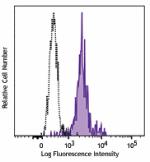
Human peripheral blood monocytes were stained with purified ... 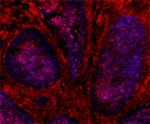
Human frozen tonsil section was fixed with 4% paraformaldehy... -
PE/Cyanine7 anti-human CD312 (EMR2)
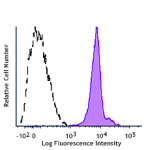
Human peripheral blood monocytes were treated with True-Stai... -
FITC anti-human CD312 (EMR2)
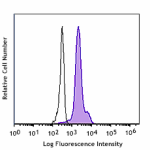
Human peripheral blood monocytes were stained with anti-huma... -
PE/Dazzle™ 594 anti-human CD312 (EMR2)
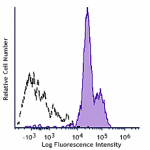
Human peripheral blood monocytes were stained with anti-huma... -
TotalSeq™-D1277 anti-human CD312
-
TotalSeq™-A1277 anti-human CD312 (EMR2)
-
TotalSeq™-C1277 anti-human CD312 (EMR2)
-
TotalSeq™-B1277 anti-human CD312 (EMR2)
-
APC anti-human CD312 (EMR2)

Human peripheral blood mononuclear cells were stained with a...

 Login / Register
Login / Register 













Follow Us